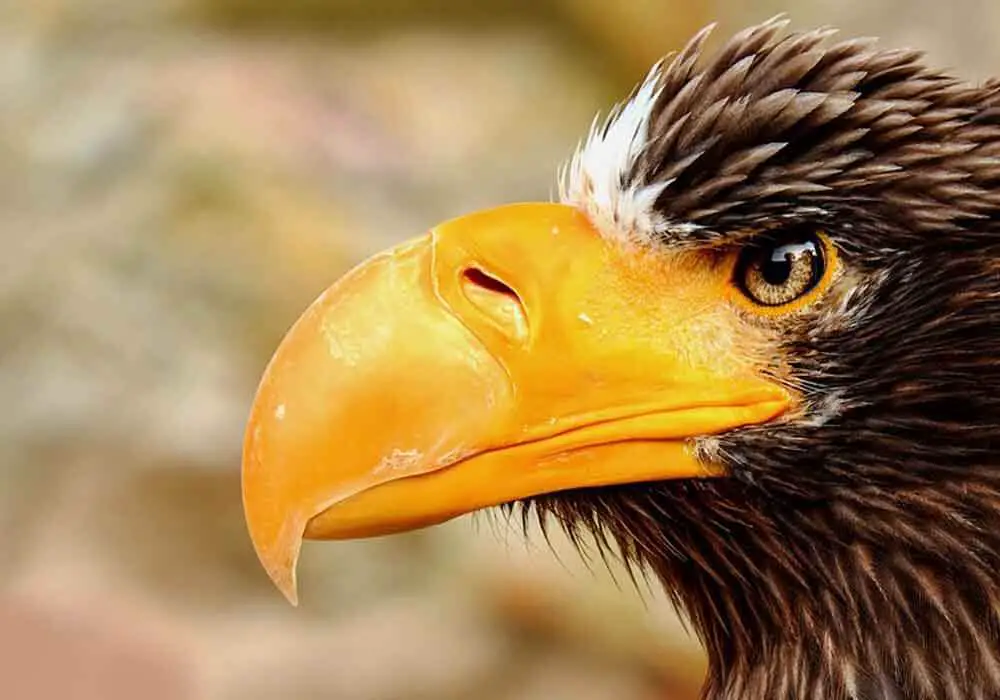Why Do Birds Have Beaks
Instead of Teeth?
It's impossible to keep a bird's teeth clean. After all, these animals don't have teeth! But why do birds have beaks instead of teeth?
Birds have evolved alternative ways to grind and digest food, so they don't need teeth. Instead, they use sharp beaks to grab and hold their food, like fruits, seeds, and insects, and an organ called a gizzard to pulverize their food into a digestible paste.
Birds descended from toothy dinosaurs (called theropods), so why don't they have a gnarly set of chompers like their long-dead ancestors? This article will answer this question and explain how birds digest foods without needing a set of pearly whites.

What Do Birds Have Instead of Teeth?
Instead of teeth, most birds have beaks. But some birds (especially birds of prey) have beaks with grooves and ridges that help them tear apart prey animals and thick vegetation.
These beaks are often wickedly sharp, making them ideal for opening fruits, cracking seeds, and injuring prey animals. But that's not the only part of a bird's anatomy that helps them enjoy a variety of foods.
Birds are also equipped with gizzards, also known as the muscular stomach.
A gizzard (ventriculus) is a small organ behind the stomach (called the crop or true stomach). Food enters a bird via its beak, travels down the esophagus, then enters the stomach.
From here, it moves into the gizzard, which consists of two distinct portions: the proventriculus and ventriculus.
Once inside the gizzard, the partially-digested food is squeezed into a fine paste. This process is expedited by the hydrochloric acid (stomach acid) and digestive enzymes released by the proventriculus, a small organ connecting the stomach and gizzard.
The gizzard itself is protected by a lining that is significantly tougher than the human stomach lining. The lining is made up of proteins and fats that keep the stomach safe as it grinds the food down into something that the bird can digest.
Without a gizzard, birds would struggle to absorb life-sustaining nutrients from their food. They'd also have problems digesting this food and transforming it into waste!
Are All Bird Gizzards the Same?
Birds are diverse animals. For example, after comparing a hummingbird to an emu, you'd be forgiven for forgetting that they're part of the same taxonomic class (Aves).
Because birds can be so physically different (depending on their species), it's easy to wonder if they all have gizzards.
All birds have gizzards, though the size and power of any bird's gizzard vary depending on its diet. For example, birds of prey that consume other animals have much stronger and larger gizzards than gentle songbirds that primarily eat insects and seeds.
Birds are not the only animals that have gizzards. Reptiles like crocodiles and alligators also have gizzards, as did the dinosaurs that birds are descended from. Certain fish and earthworms also have gizzards to help them digest their food.

Want to learn more about bird beaks? We have a whole article dedicated to everything you ever wanted to know about them. Be sure to visit our Facts About Bird Beaks page.
Do Baby Birds Have Teeth?
Baby birds do not have teeth. However, they are born with an egg tooth that they use to crack the eggshell when they’re ready to hatch. This ‘tooth’ is typically found at the front of the hatchling’s beak.
If you've ever studied baby birds (also called hatchlings and nestlings), you've likely heard of something called an egg tooth.
But despite the name, an egg tooth isn't a real tooth. Instead, it's a hardened bit of calcium found at the front of a baby bird's beak. When baby birds are ready to hatch, they use their egg tooth to crack apart the eggshell.
For most bird species, this tiny bit of extra beak falls off within the first day or so of life outside the egg. So while you could say that baby birds (newborn hatchlings, to be precise) have a single tooth, it doesn't stick around for long!
Still, this begs the question—Why do birds have beaks instead of teeth?
Why Don't Birds Have Teeth?
Understanding why birds don't have teeth can quickly get complicated. But a great place to start is by asking, "Why do any animals have teeth?"
Generally, the answer is that teeth provide a defense against predators and a better ability to pre-digest (chew) food. So, the two most significant reasons why birds don't have teeth might come down to the following:
- Alternative defense mechanisms
- New ways of digesting food
Let's explore these factors in greater detail to understand how birds survive without teeth.
Birds Don’t Need Teeth To Defend Themselves
Many animals have multiple rows of sharp teeth, which are excellent weapons for defense and attack. All you need to do is look at a great white shark's dental hygiene to understand how intimidating teeth can be!
But birds don't need razor-sharp teeth to protect themselves or attack prey. That's because birds are equipped with other built-in weapons, including:
- Talons
- Beaks
- Vocal cries
- The ability to fly
- The ability to camouflage themselves
As such, birds can fight their way out of trouble (using their talons and beaks) or flee from it (by flying away, camouflaging themselves, or emitting warning cries).
Some species even use a technique called mobbing to scare away predators! If you've ever seen a group of paparazzi following a celebrity, you're likely familiar with how terrifying a large group of loud individuals can be. Mobbing utilizes the same principle.
Of course, smaller birds that lack large talons tend to hide away from threats instead of confronting them outright.
Tiny birds might not have many biological defense mechanisms. But their smaller body size makes them faster and more agile, allowing them to escape predators quickly and covertly.
In short, all birds have specific ways of defending themselves or attacking other creatures. Consequently, they don't need a massive set of teeth to survive!
But what about chewing food? Isn't that impossible without teeth?
Birds Can Digest Food Without Chewing It First
A bird never needs to worry about visiting a dentist or investing in dentures. After all, their powerful beaks and gizzards ensure they don't need to chew their food before swallowing it.
Most birds are able to swallow their food whole. If you’ve seen birds eat, you might have noticed how they tip their heads back to push the food from their beaks into their throat. They use their tongues to push the food down into their crop and then into the gizzard to be properly ground up.
Some birds, like geese, have teeth-like structures on their tongues called tomia. The tomia tears up the tough food they eat and prepares it for digestion in the gizzard.
In some ways, a gizzard functions like a hidden, internal set of teeth. This organ is so good at mushing partially digested food that birds rarely need additional help to get the most out of their meals.

We have a full page of articles exclusively about bird anatomy. From their beaks to their feet, to their feathers, to even articles about their bones, you can find it all on our Facts About Bird Anatomy page!
Why Do Birds Have Beaks Instead Of Teeth?
Final Thoughts...
Why do birds have beaks instead of teeth? In short, birds have beaks instead of teeth because they don't need teeth to consume and digest food. Though birds descended from dinosaurs, specifically those with sharp rows of teeth, modern birds have gizzards and beaks that allow them to enjoy meals without needing to chew.
Many bird species also don't need teeth to defend themselves against predators. After all, most birds can fly away from danger or have alternative defense mechanisms that don't include a sharp set of teeth.
Back To The TOP Of This Why Do
Birds Have Beaks Instead Of Teeth Page

About the Author...
Richard Worden, a dedicated bird lover for over 20 years, I love to share my in-depth knowledge and passion for birds. Read more About Me and my expertise in this field.
- We Know Birds HOME ›
- Bird Anatomy Facts ›
- Why Do Birds Have Beaks Instead Of Teeth?



